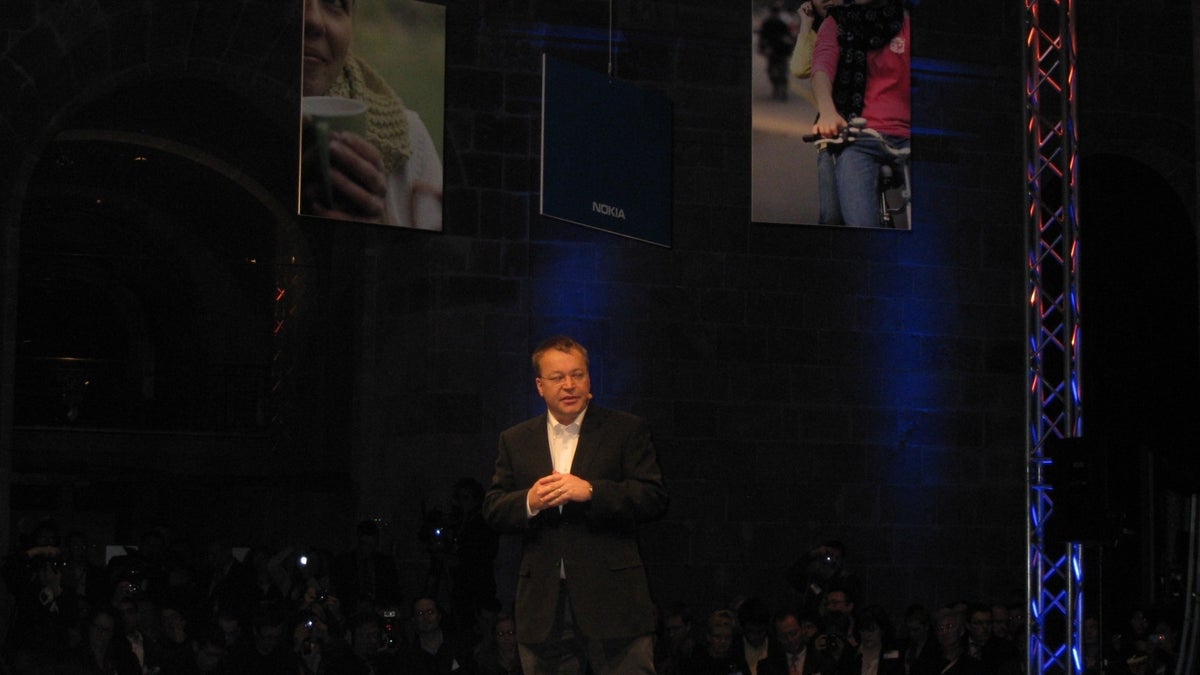Nokia CEO makes the case for Microsoft deal
Nokia CEO Stephen Elop used the company's Mobile World Congress press conference to talk about the benefits of the Microsoft deal.

BARCELONA, Spain--Nokia CEO Stephen Elop used the company's Mobile World Congress press conference here to pitch Nokia's new partnership with Microsoft.
Nokia, which typically launches a bevy of products at Mobile World Congress every year, had no new products to announce. Instead, Elop took the stage here this evening to highlight the benefits of Nokia's new strategy to make Microsoft's Windows Phone 7 its predominant mobile platform. The company announced the new strategy two days ago at its investor conference in London.
Elop explained how Nokia is using its huge market share to "swing" the market toward Microsoft's Windows Phone 7 platform. He said the company decide not to use Google's Android because adopting that platform would have concentrated too much market power in the hands of Google. By working with Microsoft, he said that Nokia is helping create a viable "third horse" in the mobile operating system race. He noted that the competition ahead in the mobile phone market is not as much about hardware as it is about operating systems.
"We are creating a swing factor," he said. "Wireless operators very much want a third ecosystem. They want customer choice and they want choices for themselves. And now they have that third choice."
But some investors in the company believe that Nokia got the short end of this deal. While the benefits to Microsoft are apparent as it competes against Google and Apple in the mobile market, it's unclear to investors how the deal benefits Nokia. Shares in Nokia fell 14 percent in Helsinki after the deal was announced Friday.
Elop tried to allay those fears as he explained that Microsoft will contribute financial benefits to the company that total in the "billions of dollars." Even though Nokia will license software from Microsoft, he said Nokia will save a significant amount of money through the partnership, because it will not have to spend as much on research and development on software.
"We are paying them for the software," he said. "But we won't have to develop the software. And there will be some very apparent operating savings from doing this."
He also noted that Microsoft will be contributing other important services and features to Nokia's devices. For example, it gives Nokia access to Bing for search in certain markets and to the Xbox platform. The relationship with Microsoft will also provide another stream of revenue for Nokia through mobile advertising, something Nokia has not been able to do on its own.
And Nokia will offer certain capabilities to Microsoft, such as location-based services and navigation through its Navteq technology.
"We are dependent on Windows Phone 7," he said. "But they are placing very significant bet on Nokia for location-based services."
As for speculation on whether this deal is a precursor to a merger between Nokia and Microsoft, he said that the companies did not discuss that as a possibility as they worked out the partnership. He said that Microsoft's and Nokia's interests are aligned in only one of Nokia's three strategic areas of focus: turning around its smartphone business. But when it comes to its mobile phone strategy in emerging markets with low-end devices and its strategy for developing next-generation products, Microsoft does not have an interest.
He also dismissed rumors that he was the seventh-biggest individual investor in Microsoft, where worked until last fall. He said that he never has had such a large stake in the company. And he added that he had been selling off his shares in Microsoft after he left the company and joined Nokia. But when Nokia entered into strategic discussions with Microsoft, he was prohibited by laws in Finland and in the U.S. from trading any more of his shares. He said that when he is legally permitted, he will once again begin selling shares.
"As soon as I'm clear of the legal restrictions, of course I'll get rid of those remaining shares," he said. He added that he plans to begin purchasing Nokia share when he is allowed to do so in an effort to show the market a "vote of confidence in Nokia."
Elop declined to say when the new Windows Phone 7 devices would hit the market. He said the company would reduce the amount of time between when it announces new products and when those products are available for sale. Nokia has traditionally used Mobile World Congress to talk about its upcoming devices for the year. And often its products are not available for months.
Elop also noted that the Qt development environment that is used for Symbian handsets to make development easier would not be usable on Windows Phone 7 applications. He said this strategy was adopted to ensure that divergent platforms don't confuse developers or consumers.

